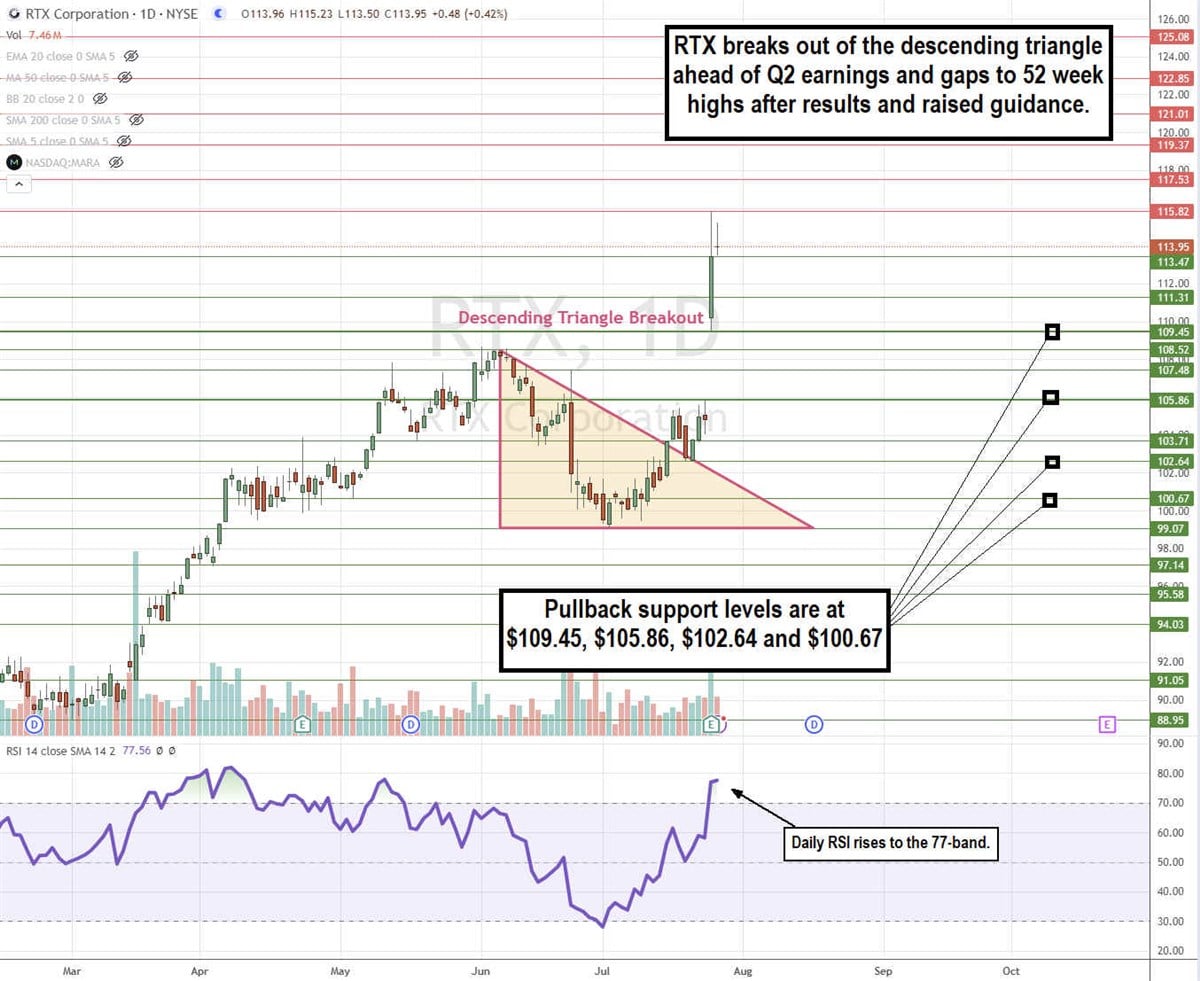
Leading aerospace and defense contractor RTX Co. (NYSE: RTX) shares surged to new 52-week highs after reporting robust Q2 2024 earnings. Raytheon officially changed its name to RTX Corporation on July 17, 2023, to broaden its identity as more than a defense contractor but also a booming aerospace company. Raytheon is now a division of RTX and is the world's second-largest defense contractor. Its aerospace division is no slouch as it continues building up a record backlog. RTX is also on the cutting edge of automation and artificial intelligence (AI) development for its various systems.
RTX operates in the aerospace sector and competes with Lockheed Martin Co. (NYSE: LMT), General Dynamics Co. (NYSE: GD), L3Harris Technologies Inc. (NYSE: LHX), and Northrop Grumman Co. (NYSE: NOC).
RTX is 3 Companies Under 1 Roof
RTX is comprised of three subsidiaries: Pratt & Whitney, Collins Aerospace, and Raytheon.
Pratt & Whitney manufactures and services aircraft engines for commercial and military clients. Their PW4000 engines are used in The Boeing Co. (NYSE: BA) 747, 767, and 777 models. The F135 engine is considered the world’s most advanced operational fighter engine. It powers the F-35 and the 5th Gen F-35 Lightening II.
Collins Aerospace provides aerospace products, advanced systems, and services, including avionics, mechanical systems, and interiors, for commercial and military clients. Its commercial aircraft parts can be found in Airbus A220, A320, and A350 airplanes, Boeing 737 MAX, 777X, and 787 Dreamliner airplanes, and commercial and military helicopters.
RTX's Raytheon subsidiary, formerly called Raytheon Intelligence & Space, designs, develops, and manufactures advanced defense systems, including missiles, electro-optical sensors, radars, and cybersecurity solutions. Raytheon became a household name with the popularity of the Patriot Missile system, which was a missile interceptor system that received much acclaim during the Persian Gulf War. The company merged with United Technologies to become the world's second-largest defense contractor. The subsidiary generates more than half its revenues from U.S. government and foreign military sales.

RTX Forms a Descending Triangle Breakout
The daily candlestick chart on RTX illustrates a descending triangle breakout pattern. A descending triangle is a bearish chart pattern comprised of a falling upper trendline representing lower highs converging with the flat-bottom lower trendline support. As the stock edges closer to the apex point, it will break down through the lower trendline, or, as RTX did, it will break out through the upper trendline. The breakout was accelerated by the earning gaps to the $109.45 level, which is now a support. The daily relative strength index (RSI) surged to the 77-band. Pullback support levels are at $109.45, $105.86, $102.64, and $100.67.
RTX Smokes Q2 2024 Earnings
RTX reported strong earnings results for its second quarter of 2024. RTX reported Q2 EPS of $1.41, up 9% YoY, beating consensus estimates by 11 cents. GAAP EPS was 8 cents. Revenues rose 8% YoY to $19.72 billion, beating $19.29 billion consensus estimates. Operating cash flow was $2.7 billion, and free cash flow was $2.2 billion. Company backlog rose to $206 billion, comprised of $129 billion of commercial and $77 billion of defense.
Every RTX Segment Was Firing on All Pistons
A breakdown of revenues indicated growth across all segments. The company also realized $120 million in incremental gross cost synergies.
Pratt & Whitney generated a 19% YoY revenue surge to $6.8 billion. Operating profit rose 136% YoY to $542 million. The sales increase was driven by 33% growth in commercial original equipment (OE), 16% increase in military, and 15% in commercial aftermarket.
Collins Aerospace grew revenues 10% YoY to $7 billion. Sales growth was driven by a 12% increase in commercial aftermarket, a 10% increase in commercial OE, and a 7% increase in military. An increase in commercial air traffic drove the commercial increase.
Raytheon revenues dipped 3% YoY to $6.5 billion. The higher volume of land and air defense systems, including Global-Patriot, Counter-UAS programs, and Stinger, was offset by the divestiture of the Cybersecurity, Intelligence, and Services business in Q1 2024.
RTX Raises Full-Year 2024 Guidance
The company treated investors by raising its full-year outlook. RTX Raised its full-year 2024 EPS forecast to $5.35 to $5.45, up from $5.25 to $5.40, versus $5.39 consensus estimates. The full-year 2024 revenue guidance has been revised upwards to a range of $78.75 billion to $79.5 billion, from the previous estimate of $78 billion to $79 billion, versus $78.96 billion. Free cash flow is expected to be around $4.7 billion, down from $5.7 billion.
RTX CEO Chris Calio was upbeat, commenting, "With a $206 billion backlog and unprecedented demand across our portfolio, we are focused on executing on our customer commitments powered by our CORE operating system, investing in innovative technologies and capabilities, and leveraging the breadth and scale of RTX to drive long-term shareowner value."
RTX Corp. analyst ratings and price targets are at MarketBeat. There are 17 analyst ratings on RTX stock comprised of three Buys, 12 Holds, and two Sells with a 30.48% upside to the consensus price target of $148.69.













